#MondayMaterials Episode 5 – Rhys Archer
Meet the Department 3 August 2015
It’s that time again! We’re already on Episode 5 of #MondayMaterials!
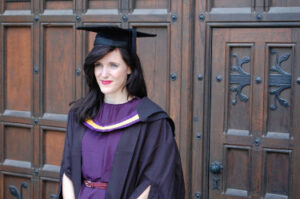
This week we chat to Rhys Archer, a PhD student who has been here with the School of Materials ever since the day she started her undergrad! Rhys first came to my attention on Twitter (@PhDArcher) where I saw her talking about the outreach work she does in schools.
I immediately wanted to get her do a guest blog post on the subject, which is something she will be doing when she can take a breath from her studies. Upon meeting her, though, it was clear that she was someone with a lot of passion for her subject, someone that would fit perfectly with the ethos of the #MondayMaterials series.
That proved to be a good prediction, as you’ll see from the answers below:
Hi Rhys – thanks for chatting to us. Could you start by explaining your research, for the layman, in ten sentences or less?
So, I work with carbon fibre.
I make up different carbon fibre panels and I insert a non-woven veil, a sort of paper like structure, in the middle. And then I test how strong it is, effectively.
In what ways could your research benefit the general public?
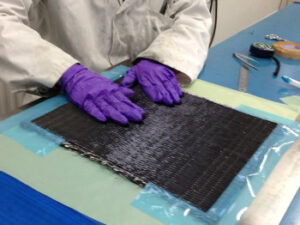
Yeah, so there’s a lot of work in composites, in what I deal with, trying to find out what makes them tougher, what makes them stronger, and how they work. So on the back of my research, industry or a company could take that and effectively make their carbon fibre in a stronger and tougher way.
So when we’re thinking about things like carbon fibre used more in aeroplanes, used a bit in spacecraft, or even in buildings and different applications, then it’s only gonna have a positive benefit on the wider public.
And how did you first get interested in your research area?
[youtube https://www.youtube.com/watch?v=JihfNX0H2vE]I did Textiles Science (ed; an old course name, but similar subject can be found on the website) here at Manchester and we did a lot on yarns and textiles, but we also did a lot on industrial textiles and technical textiles. That’s where carbon fibre falls with its industrial uses.
I was just really interested. I’d always come from textiles with the point of view of using fabric, and then we started looking at these high performance materials that were out-performing most metals, and different materials that were traditionally used for things like vehicles and planes.
I was just really interested about how those properties that I knew so well from fabric could also be translated into a really tough setting for industrial purposes.
Who or what first inspired your interest in science or materials?
[youtube https://www.youtube.com/watch?v=eIxdl33Dvf8]Well, probably my dad.
My dad didn’t go to university or anything, he never studied science. But at school, I didn’t get on with science very well – I thought it was all just learning Newton’s laws or formulas. But my dad, whenever we’d drive anywhere, he was just – I mean, he was massively into sci-fi, but he’d also always check the NASA website and the CERN website and he’d be like ‘oh, did you hear this? Did you see that?’. We’d have like three hour discussions on science, even though, you know, he’s not an academic or anything like that and I didn’t know much.
But it was those conversations that were like – ‘that’s really interesting, a lot more interesting than just being in school and just being taught formula after formula’.
And then I think I came to an Open Day at Manchester and, you know, they very much sold the courses in that way. Exploring science – it’s not about this array of formulas and just sticking the math in and putting an answer on a form. It’s about talking about science and these new exciting things that are going on. And that’s what grabbed my attention.
So I think, yeah, my dad!
Can you tell us a bit about your interests outside of work? What do you get up to in your spare time?
I try and do quite a bit, which doesn’t always work out that well when you’re doing a PhD and it’s so full on.
I was learning German at the University. So, at school I stopped doing languages because I was told I wasn’t very good at them and ever since I’ve kind of been like ‘I wanna know how to speak another language’.
The LEAP courses here are really good. I started my beginners’ course, and then I did a summer course as well. That’s been amazing because I think that for the last however many years I’ve been using my brain in a certain way and then to suddenly revisit languages and process information in such a different way – I felt like I was using part of my brain I hadn’t even used for years and years. So, I really enjoyed that.
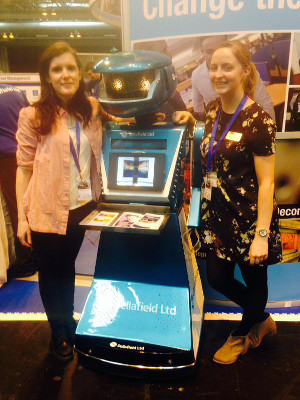
I also try and do some climbing, but mainly what I do is outreach work.
I’ve been involved in outreach since I was first an undergraduate here in 2009 and I’ve continued it ever since. I find it really rewarding. And by now I’ve got loads of contacts in schools, I know the students that I’m working with.
So, yeah, that’s something that I dedicate quite a lot of time to at the University, and the University is really supportive of it. They’ve always got different programs to get involved with and different ways of supporting people actually wanting to go out and say ‘hi, I’m from the University, I’m doing a PhD, do you want to talk about science, do you want to talk about your options?’
And I think it’s a really useful took for the local schools as well.
Brilliant – sounds like a great opportunity. Just one more question, then.Can you tell us how working here in Manchester has benefited your research?
[youtube https://www.youtube.com/watch?v=y77OplqU_pk]Yeah, so I guess for materials Manchester is a bit of a no-brainer.
The centre’s so big anyway, and I think one of the biggest things about being not just at the University but here in Manchester is the people you’re working with and the kind of industry that you’re around.
Everyone knows the textile industry around here has been around for ages and there’s still so many links within the North West. Like the old mills. There’s a company called TFP products and they actually supply me my material. They’re still based up in Cumbria at an old paper mill.
It’s connections like that which are still really important, now that textiles are starting to move into composites as well. It becomes so much more industrial and it’s important to have those links.
But then it’s also nice to have the heritage, you know. You can just go to the Museum of Science and Industry and you can see how important textiles were to the city of Manchester and building it up. And I think that globally, a lot of people have a lot of respect for people in Manchester who are working with textiles and technical textiles because of that heritage.
It draws a lot of people here to the University and the best thing about being in Materials is the people you’re working with. They’re not just UK experts but global experts in their fields and they’re teaching undergrad classes or they’re supervising PhD students.
It’s great that you’ve got that opportunity and that resource. That these people who have all these contacts and all this knowledge are there teaching you.
So I guess they’re the best things about Manchester!
Well, I don’t know if I should say this or not but that might be my favourite episode yet. Thanks, Rhys. Great to see somebody working their way through the career at Manchester and ending up doing such fantastic research and outreach! And largely because of her dad’s inspiration.
If you want to hear more from Rhys you can follow her on Twitter and LinkedIn.
Next on #MondayMaterials is Dr Gianpaolo Vignali – see you all in two weeks!
Carbon FibreCompositesMaterials SciencePhDSchool of MaterialsUniversity of Manchester

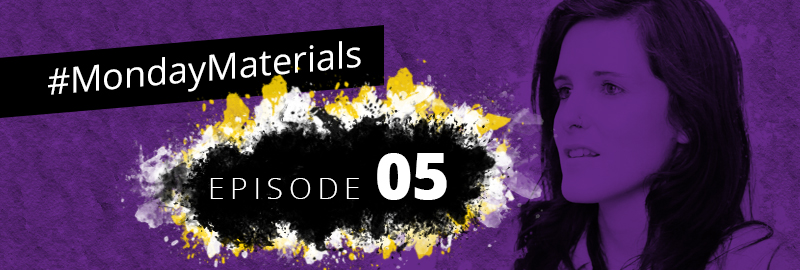
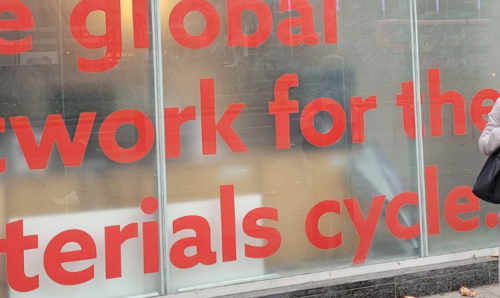
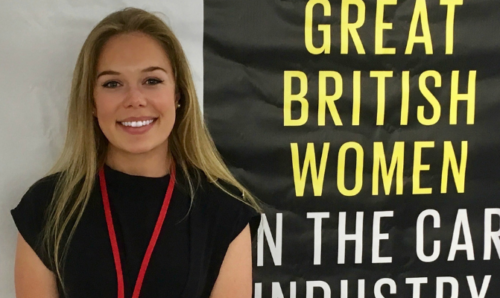

[…] and somebody who has appeared on the blog a couple of times already. Rhys Archer appeared in the #MondayMaterials series and also wrote a post for us about her success in the ‘I’m An Engineer, Get Me out of […]